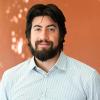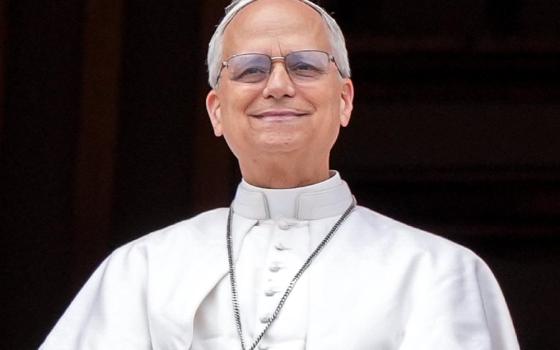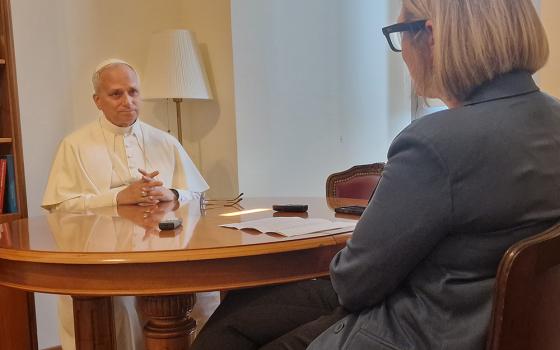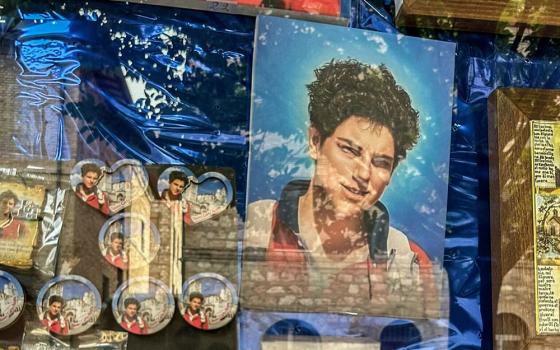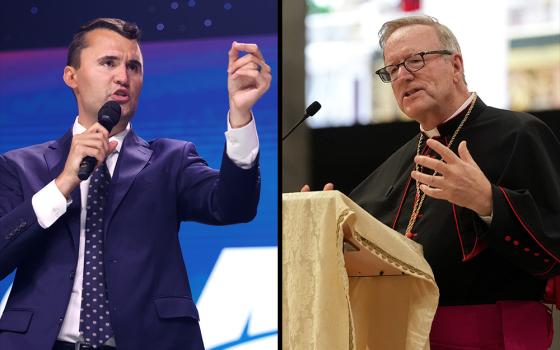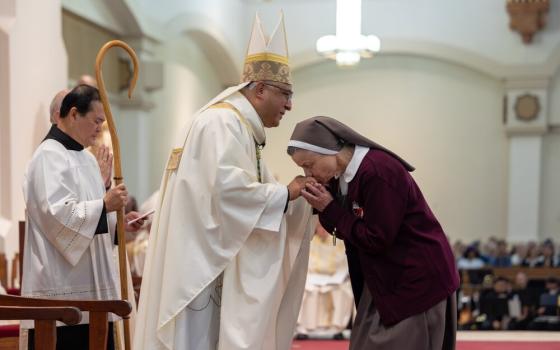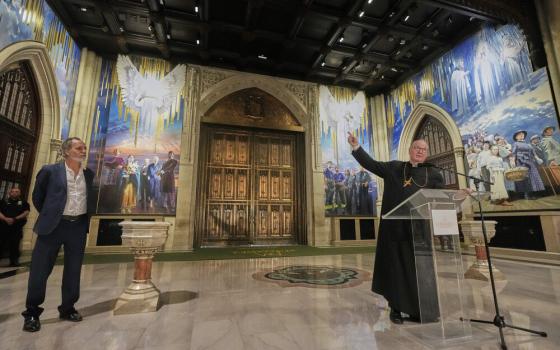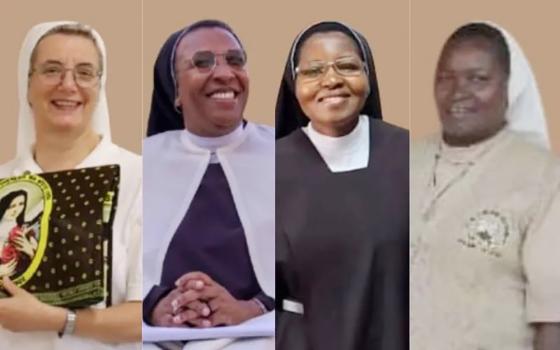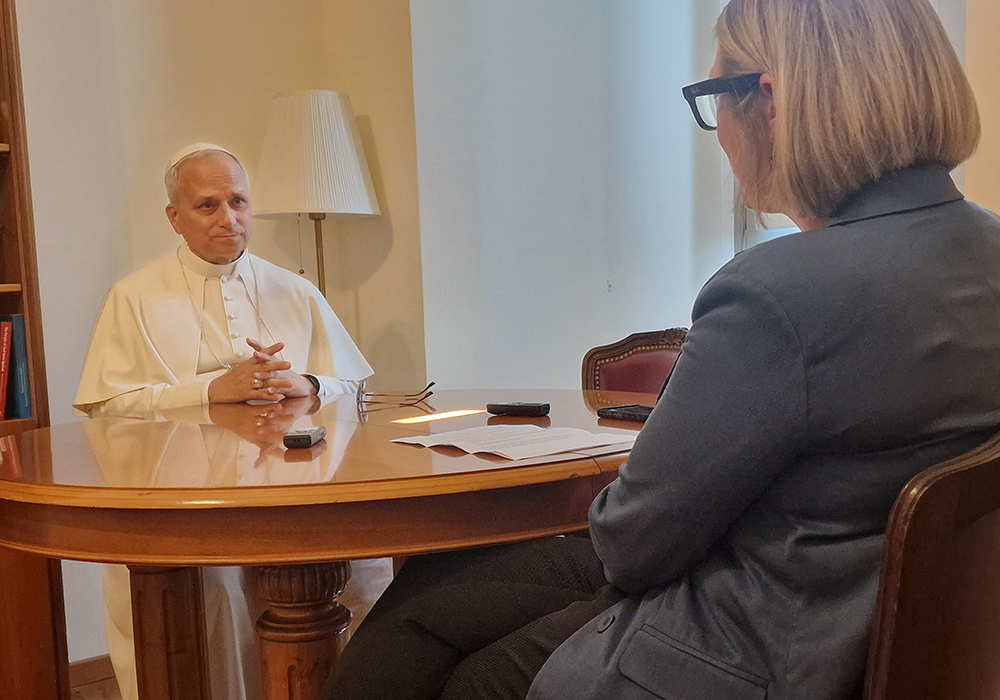
Pope Leo XIV speaks with Elise Ann Allen of Crux on July 30, 2025. (Crux photo)
Pope Leo XIV decried economic inequality between rank-and-file workers and corporate titans, referring to the possibility that Elon Musk could become the world's first trillionaire, according to transcripts from his first formal interview with a journalist since ascending to the papacy.
Leo also referred to the "huge learning curve" of his sudden new role as a world leader, condemned the war in Ukraine and said the church's practice of synodality can serve as an antidote to the polarization fracturing the church and the wider world, in an excerpt released by the Catholic news website Crux on Sept. 14, the pope's 70th birthday.
"We live in times when polarization seems to be one of the words of the day, but it's not helping anybody," the pope told Crux's Elise Ann Allen. Allen is writing a biography of the pope to be published in Spanish in Peru.
In a nod to his namesake, Pope Leo XIII, the new pontiff cited factors contributing to widespread polarization. "One which I think is very significant is the continuously wider gap between the income levels of the working class and the money that the wealthiest receive," Leo XIV said.
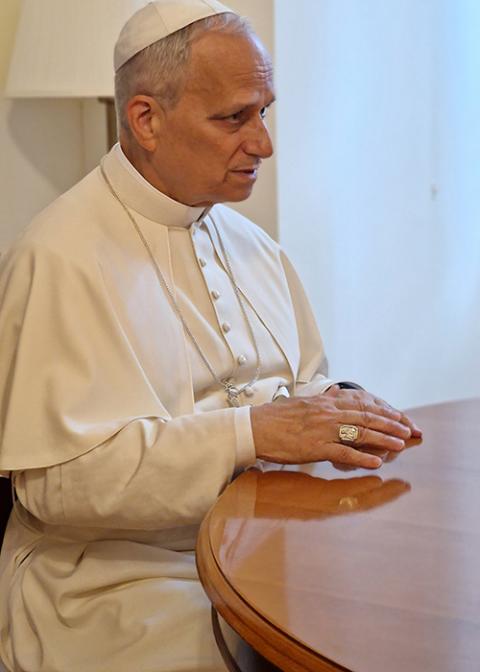
In the second of two 90-minute interviews in July, the first U.S. pope explicitly called out the discrepancy between CEO compensation relative to average worker salaries, and he cited projections that Elon Musk will become the world's first trillionaire to illustrate his point.
"What does that mean and what's that about? If that is the only thing that has value anymore, then we're in big trouble," he said.
Public debate and discussion about Musk's wealth has been in the news this year, including his possibility of the controversial tech executive becoming the world's first trillionaire. Leo's comments, however, came before the latest controversy involving Musk's trillion-dollar compensation plan at Tesla, made public in a regulatory filing on Sept. 5.
Leo's concerns echo that of his namesake, Pope Leo XIII, widely seen as the father of Catholic social teaching, who sharply criticized the unchecked accumulation of wealth and condemned the exploitation of workers.
More broadly, Leo tied the global trend toward polarization to a loss of shared values and an erosion of human dignity.
"In some places, the loss of a higher sense of what human life is about would have something to do with that," he said, pointing to the declining regard for the family, society and the value of life itself. "If we lose the sense of those values, what matters anymore?"
Leo said synodality "is sort of an antidote" to that polarization. "I think this is a way of addressing some of the greatest challenges that we have in the world today."
Many Vatican observers are waiting to see where Leo will go with synodality, which had become a lightning rod in the papacy of his predecessor, Pope Francis. Synodality refers to the active listening of Catholics across all levels of the church's hierarchy, from the pope to laypeople, on all issues including those previously considered off-limits, such as LGBTQ+ inclusion and women's leadership in the church. Some conservatives saw Francis' promotion of synodality as inviting heresy, confusion and ambiguity among the faithful.
Seated in his modestly furnished Vatican residence in the Palazzo Sant'Ufficio, Leo defined synodality in his own words as "an attitude, an openness, a willingness to understand." Yet within the church he acknowledged that "some people have felt threatened by that," particularly priests and bishops who fear they could lose their authority as a result of synodality.
"That's not what synodality is about, and maybe your idea of what your authority is, is somewhat out of focus, mistaken," the pope said. He emphasized that synodality is not an effort to "transform the church into some kind of democratic government" but rather seeking to become a church "whose primary focus is not on an institutional hierarchy, but rather on a sense of 'we together,' 'our church.' "
Prior to becoming pope, Leo launched the synodal process in his diocese as bishop of Chiclayo, Peru, in 2022. In 2023, he participated in the second general assembly of the synod at the Vatican as prefect of the Dicastery for Bishops.
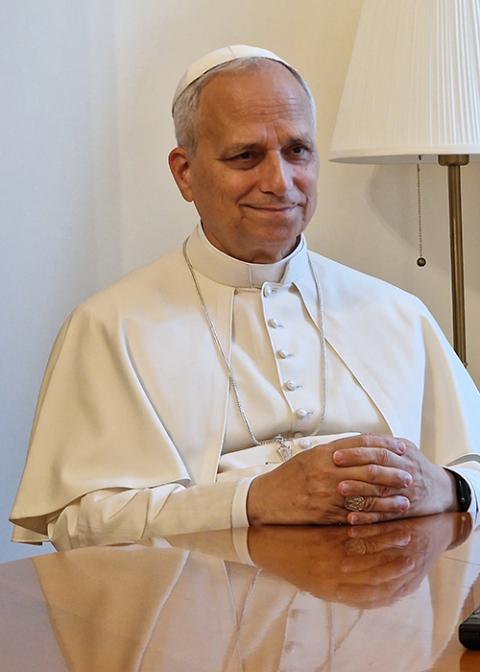
Pope Leo XIV speaks with Elise Ann Allen of Crux on July 30, 2025. (Crux photo)
Though often described as media-shy, the pope appeared relaxed and reflective in video excerpts of the interview released by Crux. Seated alone across from the journalist, without notes and only his glasses in front of him, Leo spoke about his bicultural identity and joked about his sports loyalties. "I very much feel that I'm an American," he said, though admitted he would root for Peru, where he spent more than two decades as a missionary and bishop, if the two nations' soccer teams were to meet in the World Cup.
Only about two and a half months into his papacy at the time of the interview, Leo said he has a "huge learning curve ahead of me," though the part of the role that has come to him more naturally is the pastoral side.
"The totally new aspect to this job is being thrown onto the level of world leader," he said.
In that context, Leo underscored the role of the Holy See in publicly advocating for peace in the conflict in Ukraine.
"The useless killing after these years of people on both sides – in that particular conflict, but in other conflicts – I think people have to somehow be wakened up to say, there's another way to do this."
While reaffirming the Holy See's traditional role as a diplomatic bridge-builder, Leo expressed concern about the limitations of global institutions.
"Unfortunately, it seems to be generally recognized that the United Nations, at least at this moment in time, has lost its ability to bring people together on multilateral issues," he said, suggesting that bilateral dialogue might now hold greater promise for resolving conflicts "because there are obstacles in the way on different levels for the multilateral things to proceed."
The approximately three hours of conversation between the pope and a journalist, less than three months into his pontificate, suggest a media openness that Leo had not previously revealed publicly.
By contrast, media-friendly Pope Francis gave his first formal interview to the Jesuit magazine La Civiltà Cattolica nearly six months after becoming pope, later speaking to a range of media outlets with increasing frequency over the course of his 12-year pontificate.
The National Catholic Reporter's Rome Bureau is made possible in part by the generosity of Joan and Bob McGrath.
Advertisement
